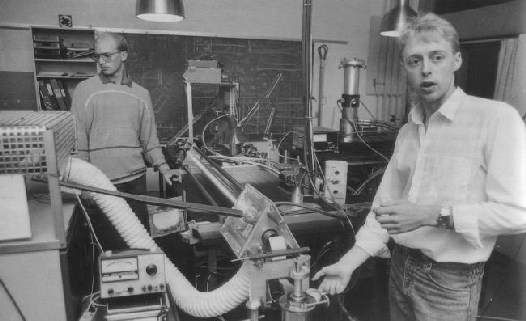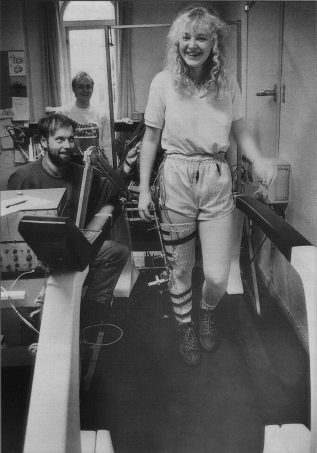In a real sense the establishment of Aalborg University in 1974 was
an exiting experiment in higher education as important as for instance,
the Open University concept in the United Kingdom. Real innovations in
education of this importance are rare and Denmark can be justly proud to
have taken a leadership role in formulating a novel project-centered higher
education method.
International Evaluation Panel.
Twenty years ago Aalborg University's project-organized studies were
introduced. The experience since then has proved this to be an important
innovation in higher education.
The curriculum in engineering as well as in the natural science is project-organized
from the day the freshmen arrive until their graduation.
The first year the freshmen learn to work in project-groups. The next
two years in the undergraduate programmes the project work is mainly design-oriented.
The last two years in the graduate programmes the project work is mainly
problem-oriented.
In the design-oriented project work the students deal with know-how
problems which can be solved by theories and knowledge they have acquired
in their lectures. In the problem-oriented project work the students deal
with unsolved problems within science and profession. The project-work
has a know-why approach and is supported by relevant lectures.
The duration of each project is one semester. In the programme half
of the time is distributed to project work, 25% to courses related to the
project and 25% to courses related to the curriculum.
This educational system has proved to have great internal adaptability.
It has not been difficult to adjust and change the educational programmes
in accordance with developments in technology, society and economy. The
system is innovative and has been able to cope with current problems in
the professions and in society.
The system has also shown great external adaptability. The graduates
are well prepared to solve the unknown problems of the future and to extend
their professional work outside their major.
The project-organized education demands a high degree of supervision
and office-space for the students. Each project-group requires the use
of an office at the university and continual supervision by a member of
the faculty. The ever changing perspective, initiated by the internal adaptability,
demands lectures to be constantly changing, or renewed. This demands much
preparation and affects the resource economy adversely. The internal adaptability
and the free choice of the students create a demand for flexibility in
the distribution of resources at the University.
But it is also an effective educational system. 80% of the students
pass their examination at the prescribed time and the Danish Parliament's
state audits assessed Aalborg University to have the most effective of
the nine Danish engineering educational institutions.

The results and experience of the research which is carried out at the
university is easily incorporated in the teaching programmes because of
their close relationship to problem-solving, and because of their direct
integration with the educational system and its programmes.
The graduates achieve great experience in interdisciplinary team work
and they will normally possess the latest scientific and methodological
knowledge, which is thus spread quickly and free of charge to both public
bodies and industry, due to the employment of new graduates.
The engineering education in Aalborg has been evaluated and compared
with traditional engineering education. This was done by two international
panels, as well as by external examinators, graduate engineers and their
employers and undergraduate and graduate students. Evaluation assessed
that there were no differences in quality or level between engineers graduated
from Aalborg University and the other Danish university engineering education
in Copenhagen.
But the evaluation also assessed significant differences between the
profiles of the graduates from the two Danish engineering universities.
The engineers from Aalborg were assessed to be stronger in problem-solving,
communication, co-operation and general technical knowledge, while the
traditional engineers were assessed to be stronger in specific technical
knowledge and methodology.
The Aalborg engineering programme was assessed to be complementary to
the traditional engineering programmes, serving slightly different needs
for students and industry.
Most of the graduate engineers from Aalborg had no difficulties in their
first job and felt confident after three months. A small number of the
civil engineers had felt difficulties with practical experience in their
first job, while a small number of the other engineers had felt some difficulties
in the field of organization and industrial culture in their first job.
There was convincing agreement between the composition of the knowledge
and experience used in the project-oriented education and in the professional
engineering practice. The only difference was slightly more emphasis on
theoretical engineering and science at the university and on economics
in industry. Surprisingly, computing and foreign languages were more important
than theoretical science for the graduate engineers in their jobs.
After three years of employment, the main source of the applied professional
knowledge still derived from their project work at the university, while
only a minor part of the applied knowledge derived from taught courses,
colleagues or postgraduate courses.

The students felt enthusiastic about the group work. They preferred
the later problem-oriented semesters with their better possibilities to
decide the content and organization of the project work and their better
scientific and technological tools to solve the problems. But the formation
of groups was found to be a difficult and sometimes painful process.
The balance with 50% project work, 25% project-oriented courses and
25% general courses was assessed as perfect.
Also the demands of the curriculum were assessed to be sufficient, but
it was judged too diffuse by a minor part of the students. The students
assessed the technical coherence in the programme as average.
There was a good overlap between the supervisors' qualifications and
the qualifications the students wished them to possess, such as willingness
to advise, engagement in and mastery of the subject, and the ability to
provide precise and clear explanations. Only at the last point many of
the supervisors failed the students grading.
Finally, the examination system with a written project report to be
presented and defended by the project group, was judged good by the students
as well as our graduate engineers, external examinators and the international
panels.
To conclude, the combination of problem-oriented and project-organized
education in Aalborg has proved to be an effective educational system,
which produces readily adaptable graduates with strong qualities in problem-solving,
communication and general technical knowledge. The weakness of the problem-based
education is the students' lower load of textbook knowledge and methodology.

